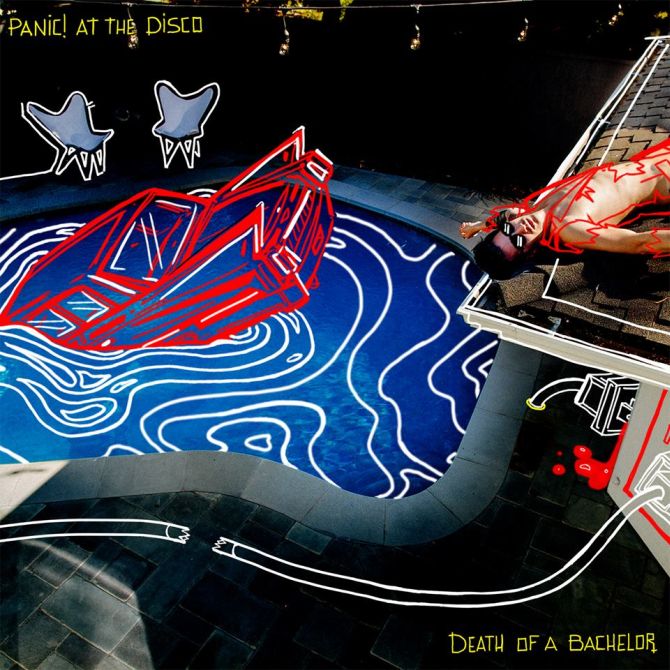What does "Golden Days" by Panic! at the Disco mean?
"Golden Days" Lyrics Meanings
I've been pleasantly surprised with Panic! at the Disco's songs that weren't the lead singles. There were plenty of good singles--sure--but I wasn't thrilled by the lyrics. Now, I'm kind of freakin' out over how good the album sounds. Death of a Bachelor sounds legit, and I'm loving it. There's a lot of throwback sound on here, and I've really been enjoying that. But I've also been enjoying the energy put into the singing; Brendon Urie's been doing a great job of making that energy powerful.
"Golden Days" is the 8th song on Panic! at the Disco's Death of a Bachelor album that was released on January 15th. The song is about the "golden days" and things changing and greying as time goes on. It's a little sad, but also touches on an important theme, one of the more solemn and lasting themes, I think, touched upon in Death of a Bachelor thus far.
The Meaning of "Golden Days" by Panic! at the Disco
In the first verse, Urie begins the song's retroactive flashback. He sings, "I found a pile of Polaroids / In the crates of a record shop / They were sex-sexy looking back / From a night that time forgot." This song is about looking at the past and looking onto a future that doesn't stop coming at us.
The first four lines here refer to the past and look back fondly at a couple from 1979. Urie says the guy "was something" and a "debonair" (stylish, good-looking, suave). The girl had "Farrah Fawcett hair," and they both were drinking "blood red wine" from "[c]arafes." The man being called debonair and the woman being compared to Farrah Fawcett suggest they were good at being "cool" in 1979. They were "on top of their game."
The pre-chorus is a repetition of the line "In the summertime." Sometimes when people look back to the good ol' days, they'll say something like "in the summer of '89" or "that one summer we went up to the lake." Based on this practice, it makes sense that the times Urie is romanticizing would be in the summer, and it also matches the hook ("Golden days" repeated several times). Imagine the "golden summer days"--the warm, yellow-and-orange summer days--as an alternate title.
The chorus brings things into the present and brings the self-reflective question with it. Urie asks, "Oh, don't you wonder when the light begins to fade?" He's not sure when it happened, but things are starting to lose their glimmer and, looking back, he realizes that he's no longer living in the "golden days."
He sings that "the clock [time] just makes the colors [energy] turn to grey [lose power]." As time goes on, the world, for him, loses strength and energy. The passions of the past are less vibrant.
While he wants to be "[f]orever young," he's "[g]rowing older just the same." Of course, when we think of the past, it doesn't change in our minds: "All the memories that we make will never change / We'll stay drunk, we'll stay tan, let the love remain." "We'll still have those memories," he's saying, "and we don't have to worry about them." He finishes the chorus by singing, "And I swear that I'll always paint you," and launches into the hook: "Golden days."
We've found that Urie is treating these memories as a painting that fades as time goes on (something that all paintings do). But he will continue to repaint them as the "golden days," wonderful times of youth and passion.
Interestingly, Urie leaves open the question of whether he's repainting them accurately. Is he romanticizing like in "Don't Threaten Me with a Good Time"? Or is he only saying that he keeps the memories vibrant and accurate? It'd be interesting to know whether he's remembering them as they are or embellishing memories to make them feel better; I'm not sure. Please comment below with your opinion.
In the second verse, Urie sings, "I bet they met some diplomats on Bianca Jagger's new yacht / With their caviar and dead cigars / The air was sauna hot." This could mean that the polaroid picture is a reference to someone related to Mick Jagger. Genius.com suggests that the couple was Mick and Bianca Jagger, but in 1979 they were already divorced according to Wikipedia.
The verse goes on: "I bet they never even thought about / The glitter dancing on the skin / The decades might have washed it out." When a person sweats, he glimmers a little, and it could look like glitter as Urie has pointed out here."As the flashes popped like pins" is a reference to cameras or the papparazzi, but the flashes are as small as "pins" because there are so many of them, and the point-of-view has to be far away to take in all of them. Unfortunately, the decades and age have taken away some of the vitality of that moment, and this picture too is beginning to fade.
The last unique stanza in the song is the bridge. In it, Urie sings, "Time can never break your heart / But it'll take the pain away." Time has passed since the glory days for the couple mentioned in the first verse, and they still remember their vitality. Thankfully for them, their distance from other events or the fact that they've lived in the "days after" the glory days means the sting has lessened.
And finally, Urie changes his focus to the future: "Right now our future's certain / I won't let it fade away." He's saying that while the past has faded, he's going to turn his attention to the future and to not let it dull before it has even happened. The big difference is that the future is certain and perhaps less exciting than the past. It, more than anything, needs to be protected because where a person's going can be changed. He's got to be ready to keep it safe for the "us" he's talking about.
Side note: Are your earbuds falling apart?
Basically everyone's earbuds are. The ones I've been using for the past two months are halfway disconnected so I can only listen through one ear, and even the sound quality through that ear isn't that great. The buds I put into my ears are a sort of plush foam, and they've been disintegrating for a while, so that's just great...
However, ten days ago, I saw an ad for Tweedz Durable Headphones. They set me up with a pair, and I got it in the mail just a few days ago.
If your earbuds are falling apart like mine, consider checking out Tweedz Durable Headphones. These headphones are nice--seriously nice. They come with a braided cover for the wires. This braid (styled like a retro guitar cord) helps them to feel/be very durable and keeps them from tangling. The colors of the braid are a nice addition as well (they come in several different combinations). The earphones themselves are excellent, made of a thin silicon that really cancels outside noise and helps the music to come through clearly and loudly. With my old earbuds, I was playing music on my Mac at about 3 or 4 clicks of volume; these earbuds are quality enough that I had to turn it down to 1 or 2.
Specs
With a low-end frequency response of 20Hz and a high-end of 20KHz, Tweedz covers what is generally considered any human's hearing range. With 32 (plus or minus 15%) ohms of impedance, these earbuds are above average in their ability to cancel electric hiss. The sensitivity on these headphones seems pretty average at 118 (plus or minus 3) decibels. The speakers are 10mm.
All-in-all, they're a superb product and have my full endorsement. If you're interested in Tweedz Durable Headphones, you should really check them out and tell them I sent you.







